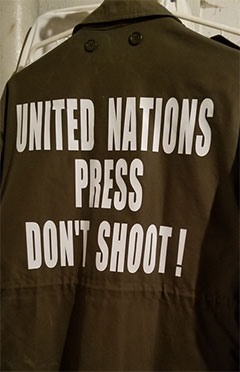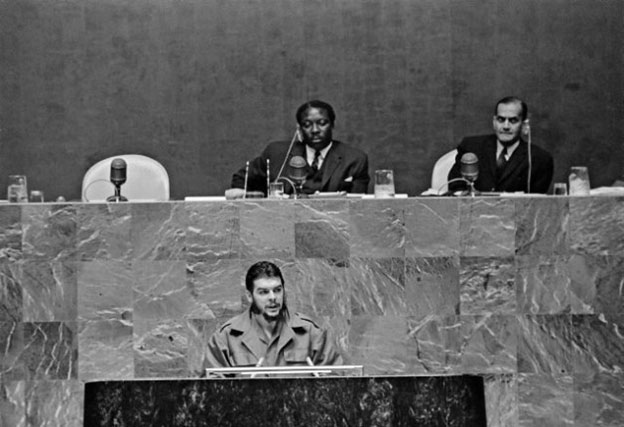UNITED NATIONS, Sep 05 (IPS) – When 150+ world leaders, including Presidents and Prime Ministers, arrive in New York to address the high-level segment of the General Assembly beginning September 19, the UN neighborhood will be turned into a veritable war zone.
The streets will be littered with scores of police officers, US secret service personnel, UN security officers, bomb-sniffing dogs, road closures — and a stand-by ambulance in the UN campus ready to cope with any medical emergencies.
The US Secret Service also has an official chaplain ready to perform last rites in case of any political assassinations in the UN premises.
The only things missing are overhead surveillance drones since a sign in the UN premises, perhaps half-jokingly, reads: NO DRONE ZONE
Meanwhile, hundreds of UN staffers and journalists are double and triple-checked for their photo IDs, at least every 200 or 300 yards outside the UN building, reminiscent of security at the Pentagon and the CIA headquarters (where your visitor ID is geared to automatically change colour if you overstay your visit).

Responding to questions on security, Paulina Kubiak, Spokesperson for the outgoing President of the General Assembly, said: … there are always restrictions during UNGA.
“As of right now, there are no COVID-related restrictions. So, no masks and no vaccinations are required,” she added.
Still, in 1964, with relatively less security, the UN building came under attack — perhaps for the first time in the history of the world body — from a mis-guided rocket launcher.
When the politically-charismatic Ernesto Che Guevara, once second-in-command to Cuban leader Fidel Castro, was at the United Nations to address the General Assembly sessions back in 1964, the U.N. headquarters came under fire – literally.
The speech by the Argentine-born Marxist revolutionary was momentarily drowned by the sound of an explosion.
The anti-Castro forces in the United States, backed by the Central Intelligence Agency (CIA), had mounted an insidious campaign to stop Che Guevara from speaking.
A 3.5-inch bazooka was fired at the 39-storeyed Secretariat building by the East River while a boisterous anti-Castro, anti-Che Guevara demonstration was taking place outside the UN building.
According to Wikipedia, the bazooka is the common name for a man-portable recoilless anti-tank rocket launcher, widely deployed by the US army, especially during World War II.
The hidden hand was visible — only the finger prints were missing — in the first terrorist attack on the UN building.
But the rocket launcher – which was apparently not as sophisticated as today’s shoulder-fired missiles and rocket-propelled grenades – missed its target, rattled windows, and fell into the river about 200 yards from the building.
The African-American civil rights activist, the late Martin Luther King Jr. once said the US is home to “guided missiles and misguided men”.
One newspaper report described the attack as “one of the wildest episodes since the United Nations moved into its East River headquarters in 1952.”
As longtime U.N. staffers would recall, the failed 1964 bombing of the U.N. building took place when Che Guevara launched a blistering attack on U.S. foreign policy and denounced a proposed de-nuclearization pact for the Western hemisphere.
After his Assembly speech, Che Guevara was asked about the attack aimed at him. “The explosion has given the whole thing more flavor,” he joked, as he chomped on his Cuban cigar, during a press conference.
When he was told by a reporter that the New York City police had nabbed a woman, described as an anti-Castro Cuban exile, who had pulled out a hunting knife and jumped over the UN wall, intending to kill him, Che Guevara said: “It is better to be killed by a woman with a knife than by a man with a gun.”
Asked if there were any other attacks on the UN, Samir Sanbar, a former assistant secretary-general and head of the Department of Public Information, told IPS the only other attack he could remember was the bombing in the Iraqi capital of Baghdad in 2003.
He said two of his closest colleagues Sergio Viera de Mello and Nadia Younes died in that attack.
“Both did not wish to go but were pushed by someone who wanted them away,” said Sanbar, who served under five different secretaries-general.
On 19 August 2003, a suicide bomber drove a truck full of explosives to the United Nations headquarters in the Iraqi capital, and blew it up, killing 22 people – among them Vieira de Mello, the UN High Commissioner for Human Rights and the head of the UN mission in Iraq.
The attack on the Canal Hotel building also wounded more than 150; most of them aid workers who had come to Iraq to help reconstruct the country following the overthrow of President Saddam Hussein.
The bombing was one of the most lethal in UN history, and marked a turning point in how the UN and aid groups operate in the field.
On August 18, the UN commemorated its annual World Humanitarian Day which was inaugurated to mark the Baghdad bombing 20 years ago.
Meanwhile, the attacks on UN peacekeeping forces have continued with 32 United Nations peacekeeping personnel — 28 military and four police, including one woman police officer — killed in deliberate attacks in 2022.
By nationality, the peacekeepers who died in 2022 were from Bangladesh (3), Chad (4), Egypt (7), Guinea (1), India (2), Ireland (1), Jordan (1), Morocco (1), Nepal (1), Nigeria (2), Pakistan (7), Russian Federation (1) and Serbia (1).
This brings the death toll to at least 494 United Nations and associated personnel who were killed in deliberate attacks in the past 12 years from improvised explosive devices (IEDs), rocket-propelled grenades, artillery fire, mortar rounds, landmines, armed and successive ambushes, convoy attacks, suicide attacks and targeted assassinations.
Over the last 78 years, the United Nations and its specialised agencies, were awarded the prestigious Nobel Peace Prize 12 times. One agency, the United Nations High Commissioner for Refugees (UNHCR) received the prize in 1954 and 1981.
In 2001, the United Nations and then Secretary-General Kofi Annan of Ghana were awarded the prize “for their work for a better organized and more peaceful world”.
But the UN did pay a heavy price in human lives for those highly-deserving awards.
This article includes excerpts from a book on the United Nations titled “No Comment – and Don’t Quote Me on That” available on Amazon. The link to Amazon via the author’s website follows: https://www.rodericgrigson.com/no-comment-by-thalif-deen/
IPS UN Bureau Report
Follow @IPSNewsUNBureau
Follow IPS News UN Bureau on Instagram
© Inter Press Service (2023) — All Rights ReservedOriginal source: Inter Press Service
Check out our Latest News and Follow us at Facebook
Original Source

